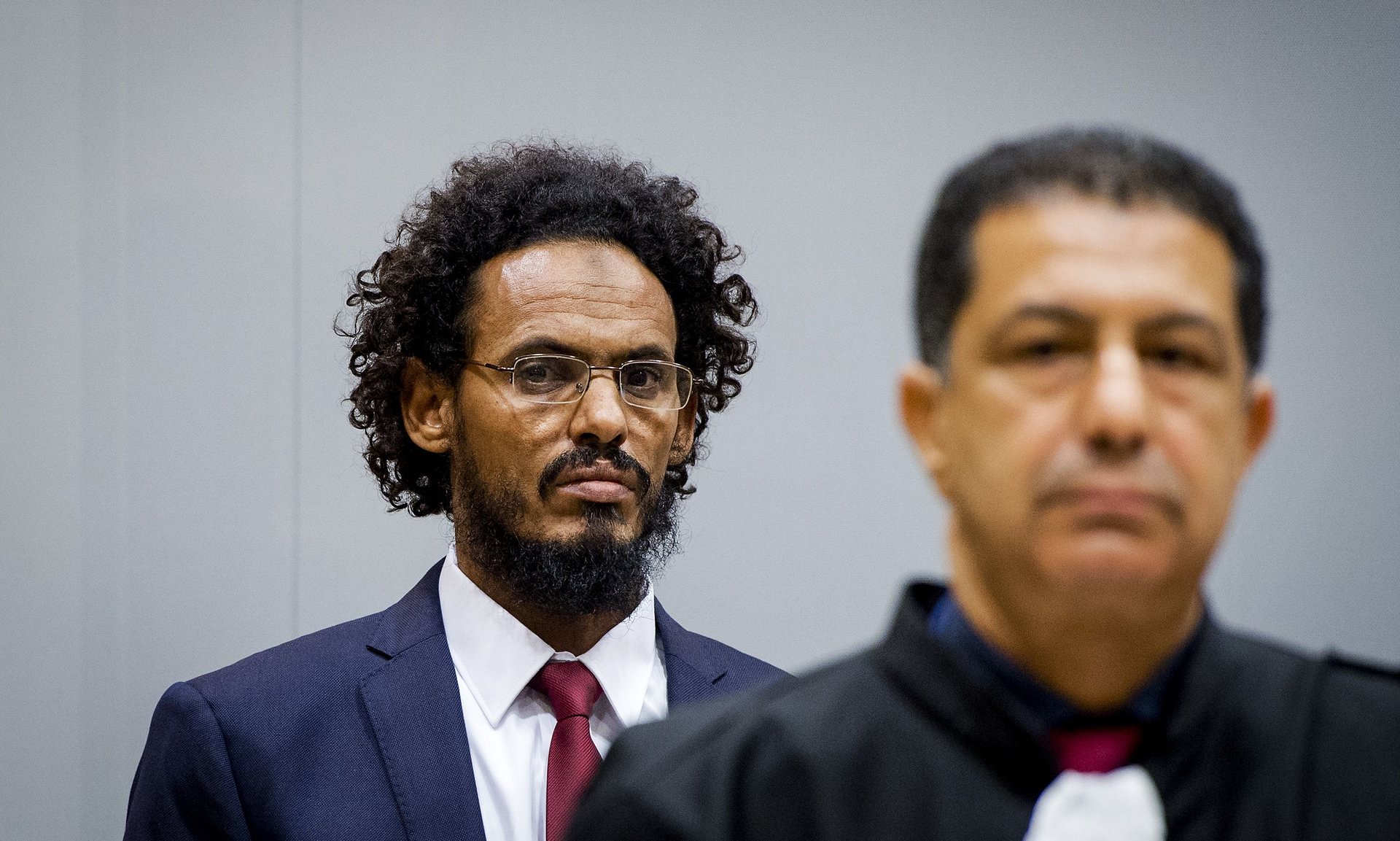
Ahmad al-Faqi al-Mahdi at the international criminal court last September. Photograph: Robin van Lonkhuijsen/AFP/Getty Images
War crimes trial of Ahmad al-Faqi al-Mahdi, accused of destroying mausoleums in Timbuktu, will begin on Tuesday.
The international criminal court’s first war crimes trial for destruction of cultural monuments opens this week against a jihadi leader accused of demolishing ancient mausoleums in Timbuktu.
Ahmad al-Faqi al-Mahdi is accused of levelling medieval shrines, tombs of Sufi saints and a mosque dating back to the 15th century that formed part of the Unesco world heritage site in the northern Malian city.
War crimes trial of Ahmad al-Faqi al-Mahdi, accused of destroying mausoleums in Timbuktu, will begin on Tuesday.
The international criminal court’s first war crimes trial for destruction of cultural monuments opens this week against a jihadi leader accused of demolishing ancient mausoleums in Timbuktu.
Ahmad al-Faqi al-Mahdi is accused of levelling medieval shrines, tombs of Sufi saints and a mosque dating back to the 15th century that formed part of the Unesco world heritage site in the northern Malian city.
The decision by the court’s chief prosecutor, Fatou Bensouda, to make obliteration of heritage a priority in dealing with the aftermath of Mali’s conflict may prove controversial in Africa but is likely to boost the ICC’s international profile.
Since Balkan warlords were charged by the international criminal tribunal for the former Yugoslavia with shelling Dubrovnik, wrecking the ancient bridge at Mostar and damaging the national library in Sarajevo in the early 1990s, those responsible for eradicating historical sites have largely escaped punishment.
No Taliban or al-Qaida leader was charged with the destruction of Afghanistan’s sixth-century Bamiyan Buddhas, which were dynamited in 2001. Khmer Rouge genocide trials did not deal with the looting of Cambodia’s Hindu temples. Nor have Islamic State leaders been indicted for destroying Assyrian statues from Nineveh or razing Roman ruins in Palmyra.
The damage inflicted on Timbuktu, known as “the city of 333 saints”, followed the rebellion of al-Qaida-inspired Tuareg militias, armed with weapons from Libya, in the central African state in 2012.
Faqi, a local ethnic Tuareg, is said to have been a member of Ansar Dine and the head of Hesbah, known as the Manners’ Brigade, which considered the mausoleums – built to pay homage to deceased saints – to be blasphemous.
He is accused of directing attacks on 10 ancient mud-brick buildings in June 2012 and July 2012. One of the desecrated sites was the Sidi Yahya mosque, built in 1440 when Timbuktu was a regional centre for learning. It contained Prof Sidi Yahya’s mausoleum.
Around 4,000 ancient manuscripts were also lost, stolen or burned during the Islamists’ reign of terror. Ansar Dine was pushed out of Timbuktu in 2013 when French forces intervened. Faqi was arrested in neighbouring Niger and sent to the Netherlands last September.
At his first remand appearance, Faqi said: “I am from the Tuareg tribe. I was born about 40 years ago. I am a graduate of the teachers’ institute in Timbuktu and I was a civil servant in the education department … beginning in 2011.”
He told judges that he wished to be addressed in Arabic and referred to by his full name. The confirmation-of-charges hearing opening the trial on Tuesday 1 March will be held in the ICC’s new court in The Hague.
There is growing resentment among African states that the UN-backed ICC has concentrated its prosecutions on the continent – a development that is partially a consequence of the United States, Russia and most of the Middle East failing to join the court. The ruling ANC party in South Africa has voted to leave the ICC.
Faqi is the first person the ICC has put on trial for the Mali conflict. There has been criticism that no major figure in the Tuareg uprising has been charged.
Mark Ellis, chief executive of the International Bar Association, who specialises in war crimes cases, said: “Politically, there will be those who will question why Bensouda is focusing on ancient sites rather than going after rape, torture and murder convictions, but destruction of cultural heritage is not a second-rate crime. It’s part of an atrocity to erase a people. I hope it will act as a deterrent to similar acts in other countries.”
The Open Society Justice Initiative in New York said there had been a previous case brought by the ICC for destroying buildings following the conflict in the Congo. Bosco Ntaganda, the former Congolese militia leader, was charged with destroying a church and a hospital, along with more serious crimes.
“But this is the first time this has been the main charge against a suspect, or when the property destroyed has had global cultural significance,” said Jonathan Birchall, of the initiative. “Al-Faqi is also the first member of an Islamist armed group to appear before the court.”
Legal authority for monument destruction prosecutions derives from a 1954 convention written in the aftermath of the second world war.
Although the 1938 Nazi-organised vandalism of Kristallnacht – targeting synagogues and Jewish property across Germany – did feature in the Nuremberg war crimes trials, none of the defendants were specifically charged with cultural destruction.
The convention covers architectural monuments, archaeological sites, works of art, manuscripts, books, other cultural objects and scientific collections. It has been ratified by more than 125 states.
Welcoming Faqi’s transfer to The Hague last September, the chief prosecutor Bensouda said the people of Mali “deserve justice for the attacks against their cities, their beliefs and their communities”.
“The charges we have brought against Ahmad al-Faqi al-Mahdi involve most serious crimes,” she said. “They are about the destruction of irreplaceable historic monuments, and they are about a callous assault on the dignity and identity of entire populations, and their religious and historical roots.”
More than 350,00 people were displaced by the conflict. Unesco has already rebuilt many of the mausoleums that were destroyed in Timbuktu.



